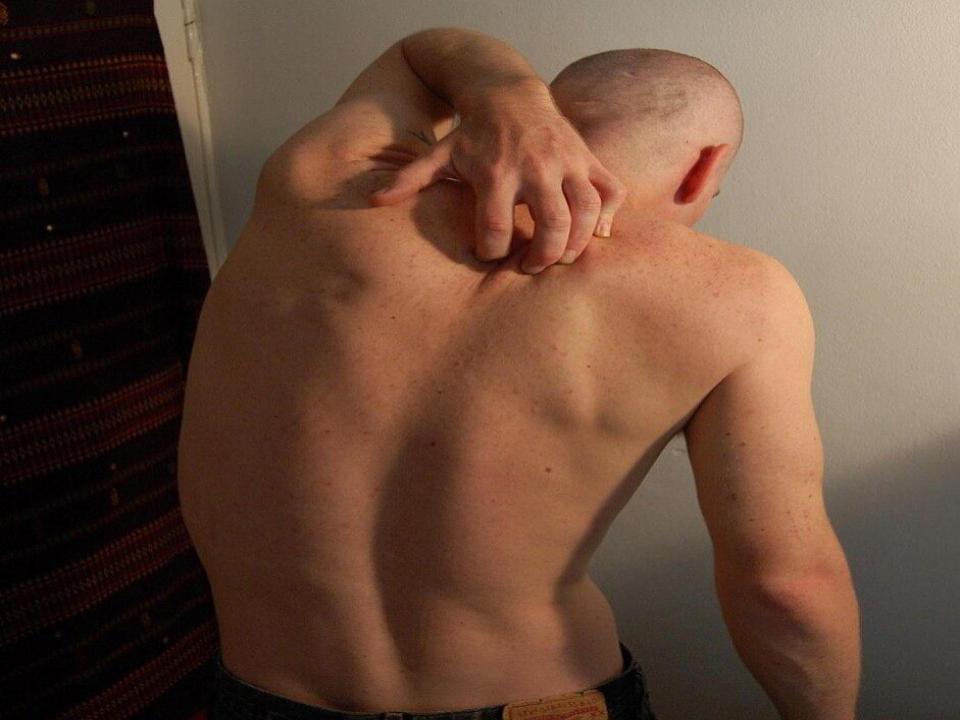
Causes:
There are several reasons why people may experience the urge to scratch at their back after taking a bath or when the weather is hot. These causes include:
- Dry Skin: Bathing, especially with hot water, can strip the skin of its natural oils and moisture, leading to dryness. Dry skin can become itchy, and scratching provides temporary relief.
- Heat and Sweating: Hot weather can cause increased sweating, leading to moisture accumulation on the back. The combination of heat and sweat can irritate the skin, triggering an itching sensation.
- Allergies and Skin Conditions: Some individuals may have allergies or underlying skin conditions such as dermatitis, eczema, or hives. Exposure to specific allergens or heat can aggravate these conditions, causing itching and the need to scratch.
- Prickly Heat: Prickly heat, also known as heat rash, can occur when sweat ducts become blocked, leading to small, itchy bumps on the skin. This condition is commonly triggered by hot and humid weather.
- Dry Air: Low humidity levels in the environment can contribute to dry skin, leading to itchiness.
- Chemicals in Products: Harsh soaps, detergents, or skincare products with fragrances or irritants can cause skin irritation and itching.
- Sunburn: Overexposure to the sun can damage the skin, resulting in sunburn and subsequent itching.
- Insect Bites: Bites from mosquitoes, ants, or other insects can cause localized itching on the back.
- Skin Infections: Certain skin infections like fungal infections or bacterial folliculitis can cause itching.
Care and Remedy:
To address the itching sensation and minimize the need to scratch, the following care and remedies can be helpful:
- Moisturize: After taking a bath, it is essential to moisturize the skin to prevent dryness. Apply a hydrating lotion or cream to keep the skin moisturized and reduce itching.
- Cool the Skin: Using a cool compress or taking a cool shower can help alleviate itchiness. The cool temperature can soothe the skin and provide temporary relief.
- Avoid Hot Water: Opt for lukewarm water instead of hot water when bathing. Hot water can strip the skin of its natural oils, leading to dryness and itching.
- Choose Gentle Products: Use mild, fragrance-free soaps and cleansers to avoid further irritation to the skin. Harsh chemicals and fragrances can exacerbate itchiness.
- Over-the-Counter Remedies: Over-the-counter anti-itch creams or lotions containing ingredients such as hydrocortisone can provide relief from itching. However, it is advisable to consult a healthcare professional before using any medication.
- Avoid Scratching: While scratching may provide temporary relief, it can also further irritate the skin. Try to resist the urge to scratch to prevent worsening of the itching.
- Topical Ointments or Creams: Applying anti-itch creams or ointments containing ingredients like calamine or menthol can help soothe the itchiness.
- Cold Compress: Placing a cold compress or ice pack on the itchy area can provide immediate relief by numbing the sensation.
- Oatmeal Baths: Taking a bath with colloidal oatmeal or using oatmeal-based products can help soothe the skin and alleviate itching.
- Natural Remedies: Aloe vera gel, coconut oil, or chamomile tea compresses can have a calming effect on the skin and reduce itchiness.

Preventive Skills:
To prevent or reduce the occurrence of itching after bathing or during hot weather, the following preventive skills can be practiced:
- Keep the Skin Hydrated: Drink plenty of water to keep the body hydrated, which can help maintain skin moisture. Additionally, using a humidifier in dry environments can prevent skin dryness.
- Avoid Excessive Heat and Sweat: Stay in shaded areas, use fans or air conditioning, and wear loose-fitting, breathable clothing to reduce sweating and heat-related irritation.
- Identify and Avoid Triggers: If certain products or materials cause itching, try to identify and avoid them. This may involve changing laundry detergents, avoiding specific fabrics, or using hypoallergenic skincare products.
- Manage Underlying Skin Conditions: If itching persists or is accompanied by other symptoms, it is advisable to consult a healthcare professional for proper diagnosis and treatment of any underlying skin conditions.
- Maintain Proper Hygiene: Regularly showering using mild soap and lukewarm water can help keep the skin clean and prevent irritation.
- Keep the Skin Moisturized: Apply a moisturizer immediately after bathing to lock in moisture and prevent dryness.
- Protect from the Sun: Use sunscreen with a high SPF to protect the skin from harmful UV rays and prevent sunburn.
- Wear Breathable Clothing: Opt for loose-fitting, lightweight clothing made of natural fabrics like cotton to allow the skin to breathe and reduce sweating.
- Avoid Known Triggers: If certain foods, fabrics, or environmental factors trigger itching, try to avoid them to prevent or minimize the onset of itching.
- Manage Stress: Stress can worsen itching. Engage in stress-reducing activities like exercise, meditation, or deep breathing exercises to help manage stress levels.
It is important to note that persistent or severe itching may require medical attention. A healthcare professional can provide a proper diagnosis and recommend appropriate treatments based on individual circumstances.
